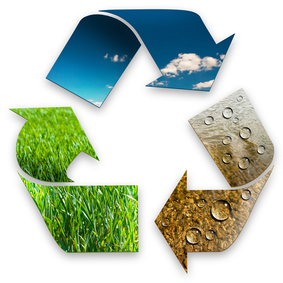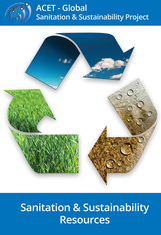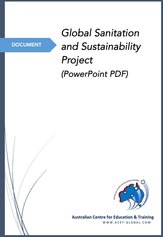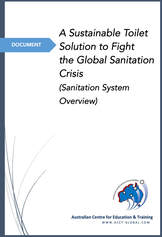
The Global Sanitation and Sustainability Project focuses on improving access to sanitation and environmentally-friendly resource management initiatives worldwide. This project has developed a toilet solution that is safe, low-cost, easy to build, simple to operate, reliable, and sustainable, in an effort to address the world's sanitation crisis. Additionally, a number of support resources for water and energy conservation and sustainable waste management is available through ACET-Global.
Sanitation, the safe disposal of human waste, is a basic human right that is vital for health and well-being. Around the world, 2 billion people still lack access to basic sanitation facilities (United Nations Children’s Fund [UNICEF] and World Health Organization [WHO], 2019, 'Progress on drinking water, sanitation and hygiene 2000-2017: Special focus on inequalities', viewed 20 March 2020). The lack of sanitation leaves people exposed to diseases, and pollutes the soil, air, and water. This leads to poor health, which contributes to endemic poverty. Diarrhoeal diseases, a direct consequence of poor sanitation, result in 432,000 human deaths annually. This figure includes the deaths of over 800 children under the age of five, every day (World Health Organization 2019, 'Sanitation', viewed 20 March 2020).
Women and girls are particularly impacted by a lack of adequate sanitation facilities and often have to wait until dark to go to open fields. This puts them at risk of attack and serious assault. Additionally, a lack of clean, safe toilets at schools leads to an increased drop-out rate among girls once they reach puberty. There is a desperate need for better sanitation in developing countries. Safe, private and clean toilets are a necessity for health, dignity, privacy, and education.
To implement the GSSP's innovative toilet solution, ACET-Global has formed a strategic partnership with SEWS-Global, a sustainable engineering company. As our trusted partner, SEWS-Global coordinates the on-ground implementation of this important project. Together, we are committed to empowering communities world-wide by improving sanitation. This will contribute to individuals' quality of life by ensuring greater dignity, privacy, and personal safety, particularly for women and girls. By improving access to suitable toilets, we can save lives and improve health. This will also support poverty reduction and economic development across the world.
Sanitation, the safe disposal of human waste, is a basic human right that is vital for health and well-being. Around the world, 2 billion people still lack access to basic sanitation facilities (United Nations Children’s Fund [UNICEF] and World Health Organization [WHO], 2019, 'Progress on drinking water, sanitation and hygiene 2000-2017: Special focus on inequalities', viewed 20 March 2020). The lack of sanitation leaves people exposed to diseases, and pollutes the soil, air, and water. This leads to poor health, which contributes to endemic poverty. Diarrhoeal diseases, a direct consequence of poor sanitation, result in 432,000 human deaths annually. This figure includes the deaths of over 800 children under the age of five, every day (World Health Organization 2019, 'Sanitation', viewed 20 March 2020).
Women and girls are particularly impacted by a lack of adequate sanitation facilities and often have to wait until dark to go to open fields. This puts them at risk of attack and serious assault. Additionally, a lack of clean, safe toilets at schools leads to an increased drop-out rate among girls once they reach puberty. There is a desperate need for better sanitation in developing countries. Safe, private and clean toilets are a necessity for health, dignity, privacy, and education.
To implement the GSSP's innovative toilet solution, ACET-Global has formed a strategic partnership with SEWS-Global, a sustainable engineering company. As our trusted partner, SEWS-Global coordinates the on-ground implementation of this important project. Together, we are committed to empowering communities world-wide by improving sanitation. This will contribute to individuals' quality of life by ensuring greater dignity, privacy, and personal safety, particularly for women and girls. By improving access to suitable toilets, we can save lives and improve health. This will also support poverty reduction and economic development across the world.
Related Resources (Documents):
Please left-click the image below to open the document.
Please left-click the image below to open the document.
Related Resources (Podcast):
Please left-click the image below to play the podcast.
Please left-click the image below to play the podcast.
Related Resources (Video Links):
For an overview of ACET-Global's Global Sanitation and Sustainability Project, left-click our video below.
|
|
|
For additional, interesting information on sanitation and sustainability, we recommend watching the following TED talks. TED is a global non-profit community dedicated to sharing free knowledge and spreading important ideas with the power to change lives for the better. These talks are linked here with the kind permission of TED.
Please left-click the links below to open the videos.
Videos related to sanitation:
Please left-click the links below to open the videos.
Videos related to sanitation:
Videos related to general sustainability:
- "A vision for sustainable restaurants" - Arthur Potts Dawson
- "Freeing energy from the grid" - Justin Hall-Tipping
- "Eco-friendly drywall" - Kevin Surace
- "A small country with big ideas to get rid of fossil fuels" - Monica Araya
- "Our campaign to ban plastic bags in Bali" - Melati and Isabel Wijsen
- "How to grow a forest in your backyard" - Shubhendu Sharma
- "Nature is everywhere - we just need to learn to see it" - Emma Maris





